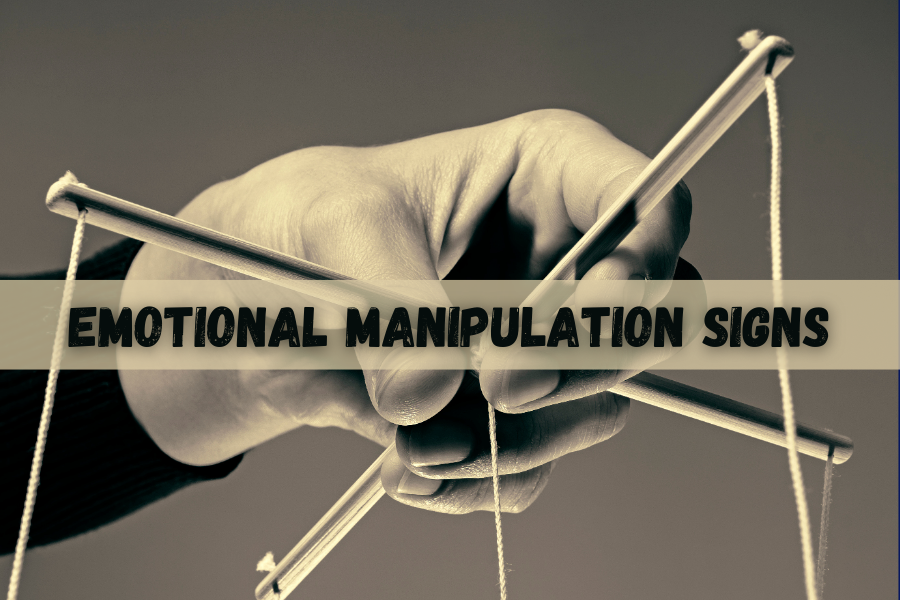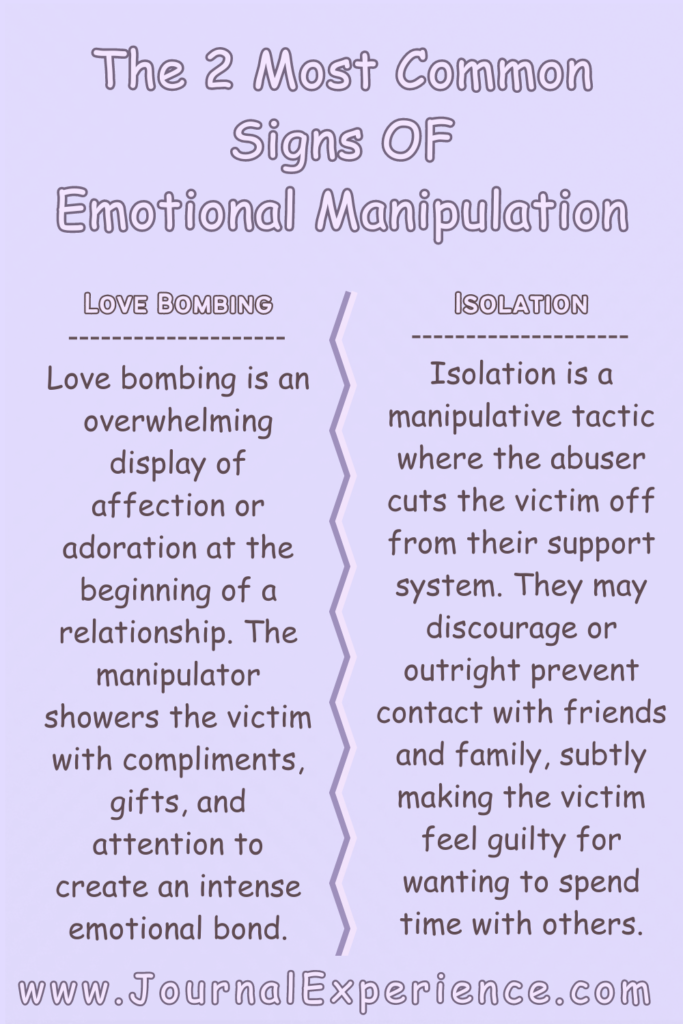Emotional manipulation is a form of covert psychological abuse where one person seeks to control or exploit another by distorting their reality, emotions, or sense of self.

It often occurs in close relationships, whether romantic, familial, or friendships, and can leave the victim feeling confused, powerless, and dependent on the manipulator. What makes emotional manipulation particularly harmful is its subtlety; victims may not even realize they’re being manipulated until the damage has been done.
This post delves deeply into the common signs of emotional manipulation, explores the profound psychological toll it takes, and offers practical strategies to break free from toxic behaviors. By recognizing the tactics used by manipulators, you can regain control over your emotions, protect your mental health, and rebuild healthier relationships.
Common Signs of Emotional Manipulation
1.Gaslighting
Gaslighting is one of the most insidious forms of emotional manipulation. This tactic involves the manipulator making the victim question their memory, perception, or even sanity.
They may repeatedly deny events, twist facts, or present outright lies to make the victim doubt their reality. For example, the manipulator might tell you that a conversation you clearly remember never happened or that you’re overreacting to something hurtful they said.
The psychological toll of gaslighting is immense. Over time, victims start to internalize the manipulator’s version of reality, believing that they are irrational or emotionally unstable.
This form of manipulation can completely strip away a person’s self-confidence, making them heavily reliant on the manipulator’s perspective.
2.Guilt-tripping
A manipulator uses guilt as a powerful tool to control their victim’s emotions and actions. By making the victim feel responsible for their problems or unhappiness, the manipulator can coerce them into doing things they wouldn’t normally do.
Guilt-tripping often takes the form of phrases like, “If you really loved me, you’d do this for me,” or “I’ve sacrificed so much for you, and this is how you repay me?”
Guilt-tripping traps the victim in a cycle of obligation. They constantly feel the need to appease the manipulator to avoid feelings of guilt, even if it means compromising their own needs or values.
The manipulator uses this sense of duty to maintain control and keep the victim emotionally tethered to them.

3.Stonewalling
Stonewalling, or the silent treatment, is when the manipulator refuses to engage in conversation, leaving the victim in a state of emotional limbo. The victim may desperately seek resolution or clarification, but the manipulator will remain silent, refuse to communicate, or walk away from discussions.
This tactic can create a sense of abandonment, making the victim feel helpless and desperate for the manipulator’s attention or approval.
Stonewalling is emotionally punishing because it withholds the validation or resolution that the victim seeks.
Over time, it can cause the victim to doubt the validity of their concerns or feelings, pushing them to give in to the manipulator’s demands just to restore communication.
4.Love Bombing
Love bombing is an overwhelming display of affection or adoration at the beginning of a relationship. The manipulator showers the victim with compliments, gifts, and attention to create an intense emotional bond.
This can make the victim feel euphoric, as if they’ve found their perfect match. However, this excessive affection is often short-lived and followed by periods of coldness, criticism, or neglect.
The purpose of love bombing is to create dependency. By flooding the victim with love and attention, the manipulator gains emotional leverage.
When they withdraw affection, the victim feels confused and desperate to regain the initial closeness, making them more vulnerable to manipulation.
5.Isolation
Isolation is a manipulative tactic where the abuser cuts the victim off from their support system. They may discourage or outright prevent contact with friends and family, subtly making the victim feel guilty for wanting to spend time with others.
This isolation leaves the victim more reliant on the manipulator for emotional validation and support.
Isolation weakens the victim’s sense of independence and self-worth. Without external perspectives, they become more susceptible to the manipulator’s influence.
Over time, this lack of social support can erode the victim’s confidence, making it harder for them to leave the toxic relationship.
The Psychological Impact of Manipulation
1.Low Self-Esteem
Emotional manipulation steadily chips away at a person’s self-worth. Constant criticism, gaslighting, and other tactics leave the victim doubting their judgment, abilities, and worthiness.
Manipulators often project their own insecurities onto the victim, making them feel inadequate or unlovable.
Victims of manipulation may find themselves seeking validation from the manipulator, which further erodes their self-esteem.
They may feel incapable of making decisions independently, and over time, they become emotionally dependent on the manipulator for approval and self-worth.
2. Anxiety
Emotional manipulation creates an environment of constant uncertainty. Victims often feel like they’re walking on eggshells, afraid of triggering the manipulator’s anger or withdrawal.
This chronic stress can lead to anxiety, as the victim is constantly second-guessing their actions or words.
In extreme cases, the victim may develop panic attacks, insomnia, or other anxiety-related disorders as a result of the emotional turmoil.
This anxiety often makes it difficult to break free from the manipulative relationship, as the victim fears the consequences of upsetting the manipulator.
3.Depression
Feelings of helplessness and despair are common in victims of emotional manipulation. As the manipulator chips away at their sense of self and isolates them from others, the victim can feel trapped in a cycle of emotional abuse.
This hopelessness often leads to depression, where the victim may struggle with feelings of worthlessness, sadness, and lack of motivation.
Depression caused by manipulation can be particularly difficult to overcome because the manipulator often reinforces the victim’s negative beliefs about themselves, making it harder for them to seek help or leave the relationship.
4.Difficulty Trusting Others
After experiencing emotional manipulation, victims often struggle to trust others, even in healthy relationships. They may become hypervigilant, constantly looking for signs of manipulation or betrayal in new relationships.
This difficulty trusting others can lead to isolation and make it harder for the victim to rebuild their sense of safety and security.
Rebuilding trust after manipulation requires time, self-reflection, and often professional help. It’s important for victims to recognize that past experiences do not define their future relationships.

If you’re struggling with depression, trust issues, or identity confusion due to long-term emotional manipulation, the Healing The Inner Trauma Child (HITCH) Method and the Codependency Cure™: Recovering from Self-Love Deficit Disorder™ offer structured guidance to help you understand the root of these wounds and begin the process of self-restoration.
Strategies for Breaking Free from Manipulation
1.Assertiveness Training
Learning to assert your boundaries is crucial in stopping manipulation. Assertiveness training teaches you how to express your needs and rights without feeling guilty or defensive.
It involves standing up for yourself calmly and confidently, even in the face of manipulation.
Assertiveness is about clear communication. It’s not about being aggressive, but about respecting your own needs while also considering the other person’s perspective.
By practicing assertiveness, victims of manipulation can resist emotional coercion and regain control over their lives.
2.Building a Support Network
Having a strong support system is essential for breaking free from emotional manipulation. Friends, family, or support groups can offer valuable perspectives, emotional support, and practical advice.
They can help you see through the manipulator’s tactics and remind you of your worth.
A support network also provides accountability.
When you’re struggling to maintain your boundaries or considering leaving a toxic relationship, your support system can provide the encouragement and reinforcement you need to stay strong.
3.Seeking Professional Help
Therapists and counselors can offer invaluable tools for identifying manipulation and building resilience.
Cognitive-behavioral therapy (CBT) can help you challenge distorted thinking patterns caused by manipulation, while trauma-informed therapy can address the deep emotional wounds left by the manipulator.
A professional can also provide guidance on how to safely leave the relationship, particularly if the manipulation is paired with other forms of abuse.
Therapy is a critical step in the healing process, providing victims with the skills and confidence needed to rebuild their lives.
Ready to break free from manipulation and start rebuilding your inner strength? The Codependency Therapy | Self Love Recovery Treatment Program provides trauma-informed tools and step-by-step strategies designed for individuals healing from emotional manipulation.
Recognizing Manipulative Apologies
1. Lack of Sincerity
A manipulative apology is often insincere. The manipulator may apologize to diffuse tension, but the words lack genuine remorse.
The apology may feel mechanical or forced, and the manipulator quickly moves on without addressing the root of the problem.
Victims should pay attention to how the apology makes them feel.
If it feels dismissive or hollow, it’s likely a manipulative tactic meant to placate rather than repair the relationship.
2.Shifting Blame
Instead of taking responsibility, manipulators often shift the blame onto the victim or external circumstances.
They may say things like, “I’m sorry you feel that way,” which subtly implies that the victim’s feelings are the problem, not the manipulator’s actions.
This tactic can leave the victim feeling guilty or responsible for the conflict, even when they did nothing wrong.
Over time, this constant shifting of blame undermines the victim’s sense of reality.
3.Conditional Apologies
Conditional apologies often come with caveats that place the responsibility back on the victim.
Phrases like, “I’m sorry, but…” or “I wouldn’t have done that if you hadn’t…” signal that the manipulator doesn’t truly accept responsibility for their actions.
These apologies serve to justify the manipulator’s behavior while invalidating the victim’s feelings, leaving them questioning their role in the conflict.
4.Gaslighting
In some cases, the manipulator may even deny the events that prompted the apology, making the victim feel confused.
If you’ve ever questioned your own memory or felt lost in a cycle of hollow apologies, the Webinar: Origins of Codependency and Pathological Narcissism will help you connect the dots and start unraveling the psychological tactics often used by manipulators.
Overview
Emotional manipulation is a destructive form of abuse that can have deep and lasting impacts on a person’s mental and emotional well-being.
Recognizing the signs is the first critical step toward breaking free from the toxic cycle of control and manipulation.
Key signs such as gaslighting, guilt-tripping, stonewalling, love bombing, and isolation are manipulative tactics that subtly erode a victim’s sense of self and reality.
However, there are strategies that can help break free from this cycle, such as assertiveness training, building a strong support network, and seeking professional help.
Recognizing manipulative apologies, which often lack sincerity or shift blame, is also essential in understanding the depth of the manipulator’s control.

Join The Journal Experience today to continue your journey toward emotional freedom and personal growth.
Become a member or subscribe to our newsletter to receive exclusive insights, support resources, and tools designed to help you navigate and overcome emotional manipulation. Take the first step in reclaiming your happiness and building stronger, healthier relationships.